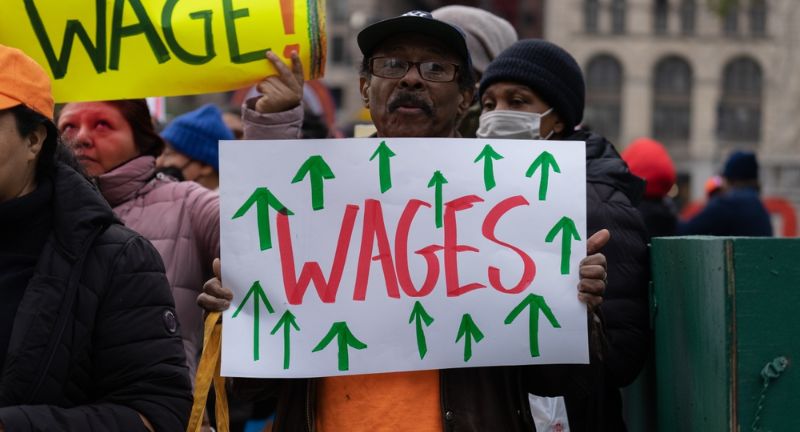NEWS
20 States Pushing for Higher Minimum Pay Amid Fierce Opposition
Published
9 months agoon

Shutterstock
As the economic divide widens, 20 states have taken a bold stand by raising their minimum wage, igniting a fierce debate across the nation. Supporters claim these increases will lift millions out of poverty, while critics warn of devastating job losses and soaring consumer prices. This contentious move has pitted workers’ rights advocates against business owners in a battle for financial survival. Dive into the heated arguments and eye-opening implications of this nationwide wage war.
California’s Wage Hike

Shutterstock
California has raised its minimum wage to $15.50 per hour, aiming to improve living standards for low-income workers. Supporters argue this increase will help reduce poverty and boost local economies. However, critics worry that businesses may struggle with the higher labor costs, potentially leading to job cuts and increased prices for consumers. The debate continues as both sides watch the economic impact unfold.
New York’s Wage Increase

Shutterstock
New York has also implemented a minimum wage hike, reaching $15 per hour for many workers. Proponents argue that this will help bridge the income inequality gap and improve quality of life for thousands. However, small businesses have expressed concerns about their ability to sustain operations with increased payroll expenses. This has sparked discussions on balancing wage growth with economic viability.
Florida’s Gradual Increase

Shutterstock
Florida has taken a gradual approach, planning to increase its minimum wage to $15 per hour by 2026. This phased strategy is intended to give businesses time to adjust. Advocates believe this will enhance economic stability and reduce poverty over time. Opponents, however, argue that even a gradual increase could harm small businesses and lead to higher consumer prices.
Illinois’s Wage Boost

Shutterstock
Illinois has raised its minimum wage to $13 per hour, with plans to reach $15 by 2025. Supporters believe this will help workers meet the rising cost of living and stimulate the economy through increased spending. Critics, however, worry that businesses will struggle with the higher wages, potentially leading to layoffs and higher prices for consumers. The impact on Illinois’s economy remains a point of contention.
Massachusetts’s Progressive Increase

Shutterstock
Massachusetts is on track to raise its minimum wage to $15 per hour by 2023. Advocates argue this will provide much-needed financial relief for workers and reduce income inequality. Business owners, however, are concerned about the increased labor costs and potential reduction in workforce. The state is closely monitoring the economic effects of this wage policy.
Maryland’s Wage Legislation

Shutterstock
Maryland has passed legislation to increase its minimum wage to $15 per hour by 2025. Proponents believe this move will improve economic security for low-income workers and reduce reliance on social services. However, some business owners fear the higher wages could lead to increased operational costs and job cuts. The debate continues as the state evaluates the outcomes of this policy.
New Jersey’s Wage Plan

Shutterstock
New Jersey has committed to raising its minimum wage to $15 per hour by 2024. Supporters argue this will help workers afford basic necessities and reduce poverty. Critics, however, are concerned about the potential negative impact on small businesses, which may struggle with the increased labor costs. The state is carefully monitoring the economic impact of this policy.
Washington’s Wage Growth

Shutterstock
Washington state has raised its minimum wage to $14.49 per hour, one of the highest in the nation. Proponents believe this will help workers cope with the high cost of living and stimulate economic growth. Critics argue that the high wages could drive up business costs, leading to layoffs or higher prices for consumers. The impact of this wage increase continues to be a topic of debate.
Colorado’s Wage Initiative

Shutterstock
Colorado has increased its minimum wage to $13.65 per hour, with plans to reach $15 in the coming years. Supporters argue this will help workers meet rising living costs and boost local economies. Critics, however, worry about the financial strain on small businesses and potential job losses. The state is watching the economic effects of this wage increase closely.
Arizona’s Wage Policy

Shutterstock
Arizona has raised its minimum wage to $12.80 per hour, with plans for gradual increases. Proponents believe this will help low-income workers and reduce poverty. However, some businesses have expressed concerns about the impact on their operating costs and potential job cuts. The state continues to evaluate the effects of this wage policy.
Oregon’s Regional Wage Increases

Shutterstock
Oregon has implemented regional minimum wage increases, with rates varying by location. This approach aims to address the diverse economic conditions across the state. Supporters argue it will help workers in high-cost areas without burdening businesses in less affluent regions. Critics worry about the complexity and potential inconsistencies in enforcement.
Vermont’s Wage Strategy

Shutterstock
Vermont has set a goal to increase its minimum wage to $15 per hour by 2024. Proponents believe this will help workers afford basic necessities and reduce poverty. Business owners, however, are concerned about the increased labor costs and potential negative impacts on employment. The state is monitoring the economic outcomes of this wage increase.
Connecticut’s Wage Plan

Shutterstock
Connecticut has raised its minimum wage to $14 per hour, with plans to reach $15 by 2023. Supporters argue this will help reduce poverty and increase economic stability. Critics worry about the impact on small businesses and potential job losses. The state is closely watching the effects of this wage policy on its economy.
Nevada’s Wage Increase

Shutterstock
Nevada has increased its minimum wage to $11 per hour, with plans for further increases. Proponents believe this will help workers manage the high cost of living and reduce poverty. Critics, however, worry about the financial burden on businesses and potential job losses. The state continues to evaluate the economic impact of this wage policy.
Michigan’s Wage Initiative

Shutterstock
Michigan has raised its minimum wage to $10.10 per hour, with plans for gradual increases. Supporters argue this will help workers cope with rising living costs and stimulate the economy. Critics, however, worry about the impact on small businesses and potential job cuts. The state is monitoring the effects of this wage increase on its economy.
Ohio’s Wage Growth

Shutterstock
Ohio has increased its minimum wage to $10.10 per hour, with plans for further increases. Proponents believe this will help workers manage living costs and boost local economies. Critics worry about the potential negative impact on small businesses and job availability. The state is closely watching the economic outcomes of this policy.
Pennsylvania’s Wage Plan

Shutterstock
Pennsylvania has committed to raising its minimum wage to $12 per hour, with plans for gradual increases. Supporters argue this will help workers afford basic necessities and reduce poverty. Critics worry about the impact on small businesses and potential job losses. The state is monitoring the effects of this wage policy on its economy.
Virginia’s Wage Strategy

Shutterstock
Virginia has set a goal to increase its minimum wage to $12 per hour, with plans for further increases. Proponents believe this will help workers manage living costs and boost local economies. Critics worry about the potential negative impact on small businesses and job availability. The state is closely watching the economic outcomes of this policy.
Texas’s Minimum Wage Debate

Shutterstock
Texas has not yet implemented a statewide minimum wage increase, but the debate continues. Supporters argue that an increase is necessary to help workers cope with rising living costs. Critics worry about the potential negative impact on small businesses and job availability. The state is closely monitoring the economic outcomes of wage policies in other states.
North Carolina’s Wage Proposal

Shutterstock
North Carolina has proposed raising its minimum wage to $12 per hour, with plans for further increases. Supporters believe this will help workers manage living costs and boost local economies. Critics worry about the potential negative impact on small businesses and job availability. The state is closely watching the economic outcomes of this policy.
Conclusion

Shutterstock
The decision to raise the minimum wage is a complex and contentious issue with significant economic and social implications. While supporters argue that higher wages are necessary to help workers cope with rising living costs and reduce poverty, critics worry about the potential negative impact on businesses and job availability. As states continue to implement and monitor these wage policies, the debate over the best approach to economic stability and growth will persist. Ultimately, the outcomes of these policies will shape the future of minimum wage laws in the United States.
Related Topics:

More From Financially+
-


13 Reasons Why Living on the U.S. Median Income Feels…
-


California’s Squatting Crisis Escalates, Drawing Critical National Attention
-


Planning Your Retirement? Don’t Skip These 23 Key Questions
-


25 U.S. Cities Perfect for Car-Free Living
-


20 Graceful Strategies for Dealing with a Rude Person
-


19 Habits To Stop Doing Immediately After Turning 60
-


20 Tell-Tale Signs Someone Has Poor Money Management
-


The Million-Dollar Myth: Retire Rich Without the Fortune
-


18 Staycation Ideas That Won’t Break the Bank